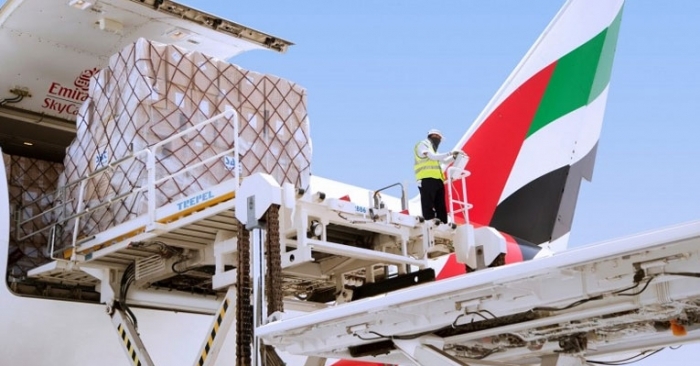Cargo helps Emirates to recover revenues from zero to 26% of last year
November 12, 2020: The Emirates Group announced its half-year results for its 2020-21 financial year with revenue at AED 13.7 billion ($3.7 billion), down 74 percent from AED 53.3 billion ($14.5 billion) during the same period last year.

November 13, 2020: The Emirates Group announced its half-year results for its 2020-21 financial year with revenue at AED 13.7 billion ($3.7 billion), down 74 percent from AED 53.3 billion ($14.5 billion) during the same period last year.
Sheikh Ahmed bin Saeed Al Maktoum, chairman and chief executive, Emirates Airline and Group said, “As passenger traffic disappeared, Emirates and dnata have been able to rapidly pivot to serve cargo demand and other pockets of opportunity. This has helped us recover our revenues from zero to 26% of our position same time last year,”
“We began our current financial year amid a global lockdown when air passenger traffic was at a literal standstill. In this unprecedented situation for the aviation and travel industry, the Emirates Group recorded a half-year loss for the first time in over 30 years,” he added.
This dramatic revenue decline was due to the Covid-19 pandemic which brought global air passenger travel to a halt for many weeks as countries closed their borders and imposed travel restrictions. As part of pandemic containment measures, Emirates and dnata’s hub in Dubai also suspended scheduled passenger flights for 8 weeks during April and May.
The Group is reporting a 2020-21 half-year net loss of AED 14.1 billion (US$ 3.8 billion).
Between April 1 and September 30, 2020, Emirates uplifted at 0.8 million tonnes cargo, decreased by 35 percent while yield has more than doubled by 106 percent. This reflects the extraordinary market situation for air freight during the global Covid-19 crisis, where drastically reduced passenger flights led to limited available capacity while airfreight demand rose strongly.
Emirates was able to uplift 65 percent of its cargo volumes compared to the same period last year, which shows its cargo division’s outstanding agility in adapting its operations to provide air freight services in this new environment. In a very short time, Emirates Skycargo completed the partial retrofit of 10 Boeing 777-300ER passenger aircraft to transport freight on the main deck, introduced new operation protocols to enable the safe uplift of cargo in passenger cabins, rapidly restarted and scaled up its global cargo network, and put in place comprehensive bio-safety protocols for employees.
dnata
dnata’s businesses in ground handling, catering and travel services were heavily impacted by the Covid-19 pandemic as customer airlines cut their flight schedules and service requirements or suspended operations entirely, and dynamic border restrictions around the world curbed travel demand and bookings.
dnata’s revenue, including other operating income, was AED 2.4 billion (US$ 644 million), a 68% decline compared to AED 7.4 billion (US$ 2.0 billion) last year.



